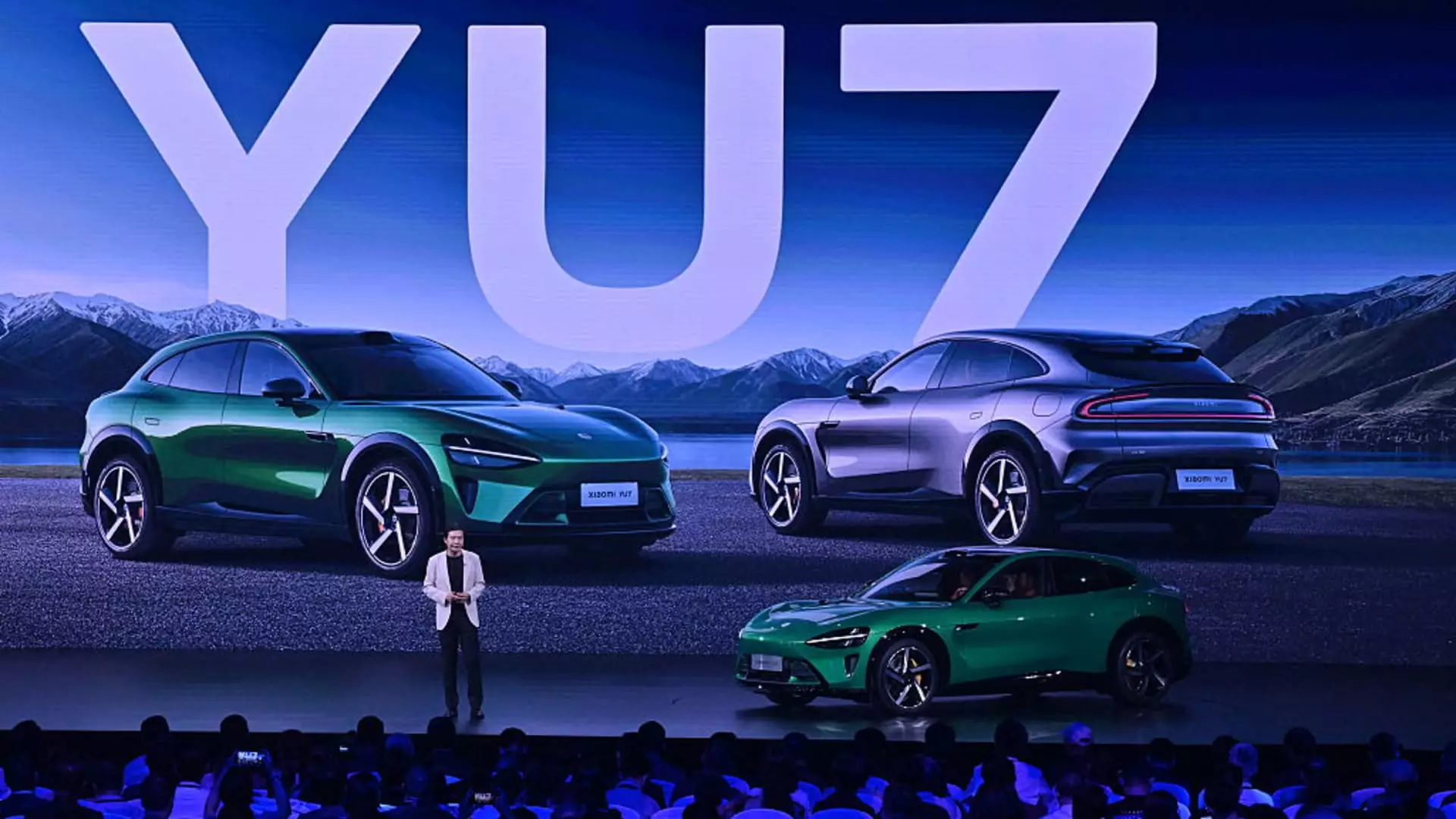In an era where electric vehicles (EVs) are reshaping the automotive landscape, Xiaomi has embarked on a courageous venture into a domain long dominated by established giants like Tesla. Known primarily for its innovative smartphones, Xiaomi is now pivoting towards electric mobility with its newly unveiled YU7 SUV. This strategic move marks less than a year after the company introduced its inaugural electric model, the SU7 sedan. The enthusiasm surrounding the YU7 is palpable, particularly given its touted driving range of 760 kilometers (472 miles) on a single charge—an impressive figure that eclipses Tesla’s Model Y, which offers a range of 719 km at its furthest.
Rethinking Range Anxiety
For many potential electric vehicle buyers, “range anxiety” is a significant barrier to adoption. The fear of a depleted battery and a lack of charging infrastructure often holds consumers back from making the transition from traditional combustion engines. Xiaomi’s ambitious claim concerning the YU7’s driving range serves as a direct challenge to this concern, positioning the company as a formidable contender in an industry focused heavily on reliability and performance. Analyst Jeff Chung from Citi has gone as far as to forecast that the YU7 could substantially chip away at Tesla’s market share in China—a bold prediction that reflects both confidence in the vehicle’s specs and Xiaomi’s emerging reputation in the EV sector.
Pricing Dynamics in a Competitive Market
Pricing serves as another critical battleground in this competitive arena. Factoring in an anticipated cost range of 250,000 to 320,000 yuan ($34,700 to $44,420), the YU7 is set to position itself squarely against Tesla’s Model Y, which starts at around 263,500 yuan in China. The implications of this pricing strategy could be significant. If Xiaomi’s YU7 can deliver quality comparable to its rivals while undercutting their prices, the potential for high sales volume is undeniable. Citi’s projection of 30,000 units sold monthly signals that there is a substantial interest and expectation for Xiaomi’s electric offerings in the Chinese market.
Positioning Against Established Players
Xiaomi appears to be strategically aligning its operations based on data insights into consumer behavior and market trends. The YU7 is being promoted as a “luxury SUV,” a labeling that could attract buyers looking for higher-end features without the luxury price tag typically associated with Tesla’s branding. According to recent reports, the Tesla Model Y was merely the second most sold new energy vehicle in China, falling behind BYD’s more economically accessible Seagull. This context indicates a shifting paradigm in consumer preferences, where affordability combined with performance could dictate market success.
The Backdrop of Recent Controversies
However, this ambitious drive is not without its pitfalls. Recent events surrounding Xiaomi’s SU7 sedan—specifically, a tragic incident resulting in fatalities—have cast a shadow over the brand. Such incidents often spark scrutiny and skepticism among consumers regarding the safety and reliability of advanced driver-assist technologies. The Chinese government’s response to mandate stricter advertising guidelines for automakers is a clear message to the industry that transparency and consumer safety cannot be compromised. For Xiaomi, this also serves as a critical checkpoint to refine its marketing strategies and enhance product communications.
Beyond Cars: The Approach Towards Innovation
Interestingly, Xiaomi isn’t merely relying on automotive prowess to define its place in this increasingly electronic ecosystem. The company unveiled its YU7 on the heels of a major launch event for a premium smartphone, showcasing an advanced chip that claims to surpass Apple’s performance metrics. This dual approach exemplifies the brand’s ambition to dominate across technology sectors—not just automobiles, but also consumer electronics. Such diversification could lend greater resilience to Xiaomi as it navigates the uncertain waters of the automotive industry.
Ultimately, Xiaomi’s entry into the electric vehicle sector could redefine the dynamics of competition, with the YU7 acting as a potential barrier breaker in a space where established players have long reigned supreme. As the turf war intensifies, consumers stand to benefit from the innovations and options that emerge from this electrifying battle.

